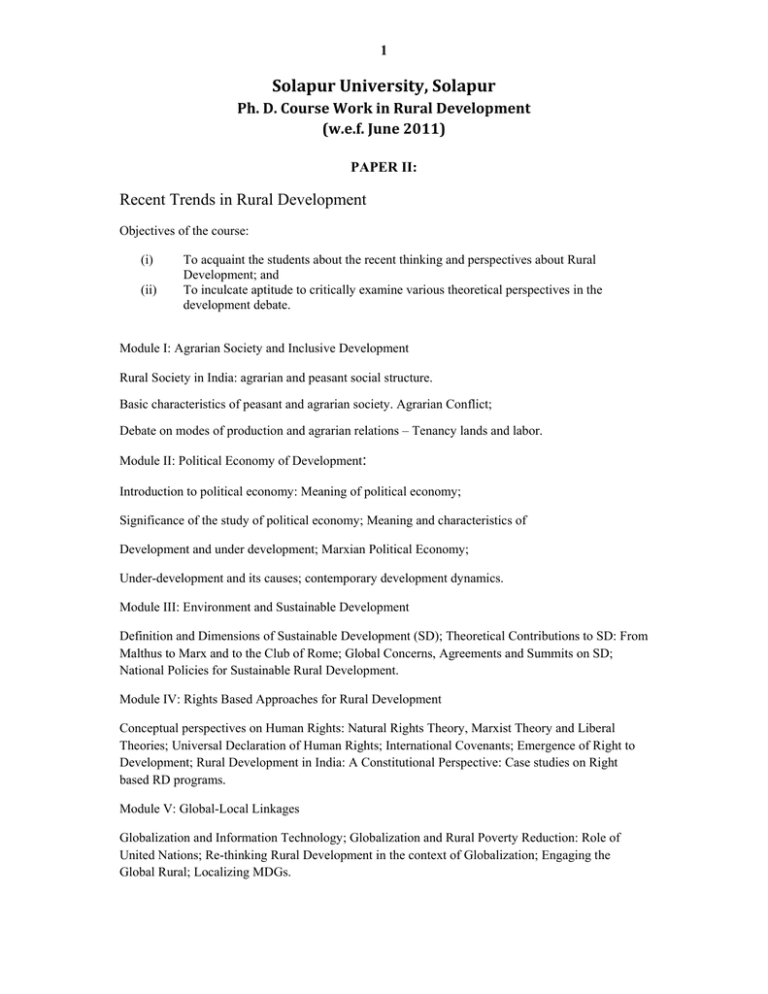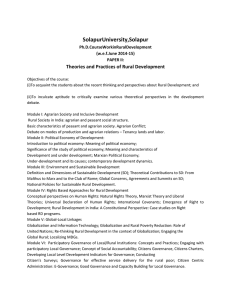Solapur University, Solapur Recent Trends in Rural Development Ph. D. Course Work in Rural Development (w.e.f. June 2011)
advertisement

1 Solapur University, Solapur Ph. D. Course Work in Rural Development (w.e.f. June 2011) PAPER II: Recent Trends in Rural Development Objectives of the course: (i) (ii) To acquaint the students about the recent thinking and perspectives about Rural Development; and To inculcate aptitude to critically examine various theoretical perspectives in the development debate. Module I: Agrarian Society and Inclusive Development Rural Society in India: agrarian and peasant social structure. Basic characteristics of peasant and agrarian society. Agrarian Conflict; Debate on modes of production and agrarian relations – Tenancy lands and labor. Module II: Political Economy of Development: Introduction to political economy: Meaning of political economy; Significance of the study of political economy; Meaning and characteristics of Development and under development; Marxian Political Economy; Under-development and its causes; contemporary development dynamics. Module III: Environment and Sustainable Development Definition and Dimensions of Sustainable Development (SD); Theoretical Contributions to SD: From Malthus to Marx and to the Club of Rome; Global Concerns, Agreements and Summits on SD; National Policies for Sustainable Rural Development. Module IV: Rights Based Approaches for Rural Development Conceptual perspectives on Human Rights: Natural Rights Theory, Marxist Theory and Liberal Theories; Universal Declaration of Human Rights; International Covenants; Emergence of Right to Development; Rural Development in India: A Constitutional Perspective: Case studies on Right based RD programs. Module V: Global-Local Linkages Globalization and Information Technology; Globalization and Rural Poverty Reduction: Role of United Nations; Re-thinking Rural Development in the context of Globalization; Engaging the Global Rural; Localizing MDGs. 2 Module VI: Participatory Governance of Local/Rural Institutions: Concepts and Practices; Engaging with participatory Local Governance; Concept of Social Accountability; Citizens Governance, Citizens Charters, Developing Local Level Development Indicators for Governance; Conducting Citizen’s Surveys; Governance for effective service delivery for the rural poor; Citizen Centric Administration: E-Governance; Good Governance and Capacity Building for Local Governance. Reference: Internet Sources BASIC READING LIST: Agrawal; A.N. Lal kundan : 1989 Economics and development and planning, New Delhi: Vikas publishing House private limited. Augushine, john S.(ed) : 1989: Strategies for Third World Development, New Delhi: Sage Publications. Chakraborthy, Bimal.1996 : The United Nations and Third World, New Delhi: Tata McGraw Hill Publishing Company Limited. Descrochers, john.1977: Methods of social Analysis, Bangalore: Centre for Social Action. Elsenhans, Hartmut.1991: Development and Underdevelopment: The History Economics and Politics of North South Relations, New Delhi: Sage publication. Nagardra, S.P. 1994: Development and Change, New Delhi: Concept Publishing Company. Nana Poku Lloyd. Pettiford(ed) 1998: Rebuilds up the Third World, London: Macmillan Press Limited. Rao,D.Bhaskar.1998: World Summit for Social Development, New Delhi: Discovery Publications. Rao, V.Lakshmana.1994: Essays on Indian Economy, New Delhi: Ashish Publishing House 8/81 Punjabi Bagh. Reddy, D.V.1994: Development and New International Economic Order, New Delhi: Deep and Deep Publications. Rugman Alan.2000: Theory of Globalization, London: Random House. Seltz, John L. 1990: The Political of Development, Bombay: Popular Prakashan. Sharma S.L(ed) 1986: Development: Socio Cultural Dimensions, Jaipur: Rawat Publication. Sing C.Chew, Robert A.Denemark (ed.) 1996: The under development of Development, New Delhi: Sage publications. Tandon,B.B & K.K. Tandon: Indian Economy, New Delhi: Tata Mcgraw Hill Publishing Company Limited. JOURNALS Monthly commentary Indian institute of public opinion, New Delhi. Economic and political weekly. EPW Research Foundations, Mumbai. Journal of Indian School of Political Economy: Indian school of political economy, Pune. 3 PAPER III: EMERGING ISSUES AND CONCEPTS IN RURAL DEVELOPMENT Objectives of the Course: (i) (ii) To introduce the students to changing notions and concepts of rurality and rural development; and To sensitize students in the application of newly emerging concepts in the field. Module I: Contributions of Amarthya Sen and Mohamed Yunis to Development Thinking; Welfare Economics of Amarthya Sen; An Overview of: Poverty and Famine (1981); Resources, Values and Development (1984); and Commodities and Capabilities (1985); Micro Finance and Empowering Locals. Module II: Human Development: Concepts and Measures Human Development: Meaning and Approach; Critic of Growth Oriented Theories; Evolution of Human Development Issues and Reports; Human Development Measures and Indicators/indices; Methods of computing HDI, critique of HDI; Other Indices: Human Poverty Index (HPI), Gender Development Index (GDI) and other qualitative measures. Module III: Corporate Social Responsibility (CSR) CSR and Rural Development; What is CSR; Some Dimensions of CSR; How it is implemented; CSR as Market Strategy; Importance of CSR for RD; Some Case Studies with reference to RD in India. Module IV: Foreign Aid and Rural Development The concept of bilateral and multilateral aid for Rural Development; Aid giving Institutions and Mechanisms of governance; Aid for Sectoral Development; Expected Impact of Aid; Motives of Aid; Critiques and Controversies of Aid; Why Aid and Politics of Aid; Module V: Re-inventing Ruralities and Rural Tourism Rurality and Development: Some conceptual Issues; Landscape Heritages; Creating Resources through Clustering; Emerging Trends in Agri-tourism and Rural Tourism; PURA of GoI. Module VI: Application of Tools/Techniques (MIS, GIS and GPS, PRAs, Micro-planning, and Social Audit) References: Internet Sources BASIC LIST OF READING: Gadgil, D.R. 1967. District Development Planning. Gokhale Institute of Politics and Economics: Poona. Government of Maharashtra, (2002) Human Development Report. Haq, Mahbub Ul 1998. Reflections on Human Development. Oxford University Press, New Delhi. 4 Human Development Report 1990. Oxford University Press, New Delhi. Human Development Report 2004. Oxford University Press, New Delhi. Seth, Mira 2001. Women and Development: Indian Experience. Sage, New Delhi. Singh, Radha Raman 1982. Studies in Regional Planning and Rural Development. Associated Book Agency: Patna. Singh, Tarlok 1969. Towards an Integrated Society: Reflections on Planning, Social Policy and Rural Institutions. Orient Longman: Bombay. Tim Allen and Alan Thomas (eds) 1990. Poverty and Development: Oxford University Press, Oxford. 5 PAPER IV: FIELD ACTION PROGRAMS: Conception, Implementation and Appraisals Student shall choose any one program intervention in collaboration with the state agency, NGO, Civil Society, International Development Organization or Corporate Bodies and carry out the following exercises. Or can examine a Field Action Program in terms of the following modules. All modules given below have self contained and self explanatory manuals and guidelines and the students will have clear cut conceptual understanding in class room lectures and discussions. Module I: Situational Analysis and Need Assessment Module II: Building an Action Proposal/Project/Alternative Strategies Module III: Working with the Stakeholders and Program Managers Module IV: Evaluation of Interventions Module V: Preparation of Appraisal Report Module VI: Advocacy and Presentation References: Internet Sources and Field Manuals Already Available on Websites. 6 Ph.D. (Course Work) Nature of Question Paper Pattern • Ph.D. úÖêÃÖÔ¾ÖÔúÃÖÖšüß ±úŒŸÖ Long Answer ¾Ö Short Answer †ÃÖê“Ö ¯ÖÏ¿−Ö †ÃÖŸÖß»Ö. • Ph.D. (Course work) ¯ÖÏ¿−Ö¯ÖסÖêúŸÖ úÖêÖŸÖÖÆüß External Option ¾Ö Objective ¯ÖÏ¿−Ö †ÃÖÖÖ¸ü −ÖÖÆüߟÖ. • ‹æúÖ ¯ÖÏ¿−Ö - 5 x ÖãÖ 20 = 100 ÖãÖ • ¯ÖÏ¿−Ö Îú´ÖÖÓú 1 ŸÖê 5 • (A) פü‘ÖÖì¢Ö¸üß ¯ÖÏ¿−Ö (10 ÖãÖ) (B) Answer Any two out of three (¯ÖÏŸμÖêúß 5 ÖãÖ) μÖÖ ¯ÖÏ¿−Ö¯ÖסÖêú“μÖÖ Ã¾Ö¹ý¯ÖÖ´Öãôêû Internal Option ÆüÖ 25% ¸üÖÆüŸÖÖê.


